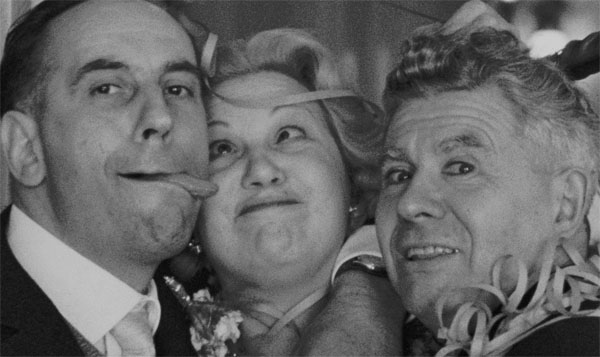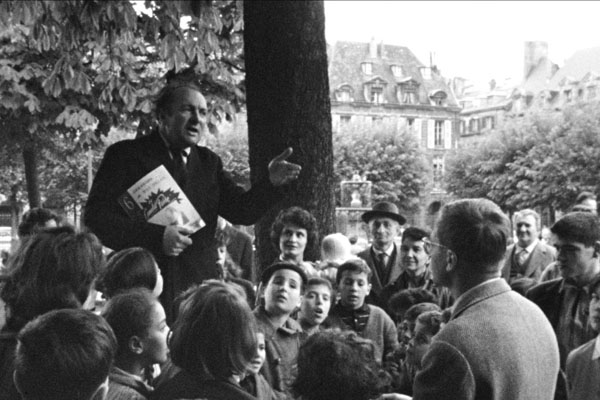“One of the most influential movies that you have likely never seen Chris Marker’s 1963 documentary Le Joli Mai has been reedited (by Marker in 2009), restored, and re-released,” begins J. Hoberman at Artinfo. It opens tomorrow at Film Forum in New York, Northwest Film Forum in Seattle, and the Museum of Fine Arts in Houston (and Icarus Films has further dates and cities lined up for the weeks to come). But that’s tomorrow. More urgently, tonight, which is to say, in a few hours, cinematographer Pierre Lhomme will be at the Film Society of Lincoln Center, where a short he shot with Marker, Be Seeing You (1968) as well as another he made with the Medvedkin Group, Class of Struggle (1969) will screen along with Jean-Pierre Melville’s Army of Shadows (1969). Adds Erik Luers for the FSLC: “Having lensed for directors such as James Ivory, Robert Bresson, Joris Ivens and Jean Eustache, the BAFTA and Cannes winner (for Cyrano de Bergerac starring Gérard Depardieu) has had a prolific career spanning over six decades.”
As Hoberman writes, Marker and Lhomme’s Le Joli Mai was made “in response to the founding example of cinema verité, Jean Rouch and Edgar Morin’s 1962 Chronicle of a Summer,” and indeed, you may recall that Amy Taubin has just written about both films at length for the current issue of Artforum. Hoberman: “Le Joli Mai was less confrontational than Chronicle of a Summer but more subversive. After opening with the bland assertion that Paris is ‘the most beautiful city in the world,’ the movie settles in to document the lengthy complaints of a suit salesman standing outside the shop where he is employed. Images of new housing construction are rendered ambiguous by interviews with poor families overjoyed at being ‘re-housed’ and complaints by progressive architects that Paris’s essential character is being threatened. A young couple speaks of their all-consuming happiness in blithe disregard to anything than might be happened around them, or in the world. Immediately, Marker and Lhomme plant their camera in the midst of a raucous wedding replete with a drunken food fight.”
“Le Joli Mai, at times perhaps one of Marker’s most directly antagonistic films, captures the spirit of a populace at what was then the first quantifiable period of peacefulness in well over a generation,” notes Eric Henderson in Slant. “With the Évian Accords effectively ending the Algerian War, France in May of 1962 was experiencing its first era without any involvement in wars in 23 years.” And Le Joli Mai was made while Marker was “in the thick of starting and stopping time itself with his sci-fi masterpiece La Jetée.”
“What we hear and see in this black-and-white documentary is precisely the life that grows on and in the fixed spaces of the city, the trellis,” writes Charles Mudede in the Stranger. “This life also has lots and lots to say about politics, religion, communism, atheism, colonialism, music, cinema, money, real and fake flowers, food, transportation, strikes, housing, the youth, the old, the French, the language, the history of civilization, what works in the city and what doesn’t work, and, most importantly, what makes a Parisian happy.”
For more reviews, including those by Aaron Cutler in the Voice and Benjamin Schultz-Figueroa for the Brooklyn Rail, turn to Critics Round Up.
Update, 9/14: “The particulars are where things get interesting,” writes Nathan Rogers-Hancock at Cinespect. “Many of the images resemble the harsh, shadowed world of La Jetée; at times the film seems less like a documentary than like the paranoiac city films of Jacques Rivette.”
Updates, 9/21: “Chronicle of a Summer, with its emphasis on the connection between censorship and misery, between failures of representation and personal crises, foreshadows the idea and the events of ’68,” writes the New Yorker‘s Richard Brody. “Le Joli Mai repudiates them in advance. Marker made a film about those events a decade afterward, A Grin Without a Cat, and its thesis is that 1968 actually happened in 1967—that the generational and (no pun intended) cultural revolution of 1968 was a mere epiphenomenon resulting from the expressly political uprisings of the year before (which, however, didn’t result in widespread political revolution). As with Le Joli Mai, the result is a great and absorbing film that leaves a sordid taste of stifled rage, a frustration that doesn’t even dare to reveal its fury. That’s how these resolutely non-reflexive films come nonetheless to turn inward on themselves. Their analysis coalesces with their untimeliness, their curiosity with their isolation.”
David Gregory Lawson for the FSLC: “Introducing Le Joli Mai to the audience at Film Forum, Lhomme saluted Richard Leacock, Albert Maysles, and French-Canadian filmmaker Michel Brault (especially Pour la suite du monde, about a community of whalers living past the end of their myth, as Anne Carson might put it). He praised their pioneering use of observational camerawork in creating an immersive documentary aesthetic rooted in the passion of the moment, in the lack of control and the freedom that results. The revelatory experience he had watching Primary led to his desire to shoot with the lightweight 16mm cameras and sync sound recording devices used so expressively by Leacock and his team. As Lhomme shared his thoughts on the matter, Maysles, for his part, sat beaming in the third row.”
For news and tips throughout the day every day, follow @KeyframeDaily on Twitter and/or the RSS feed. Get Keyframe Daily in your inbox by signing in at fandor.com/daily.





